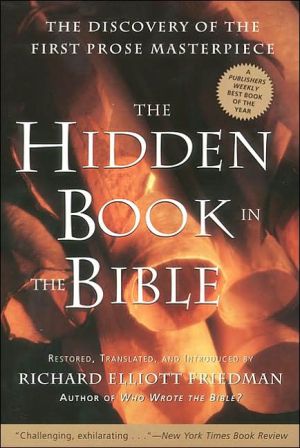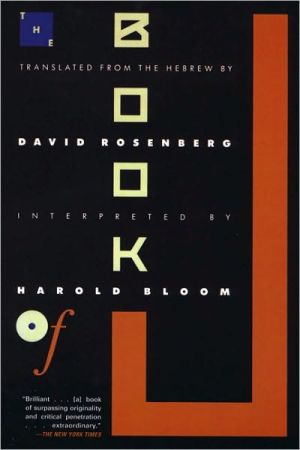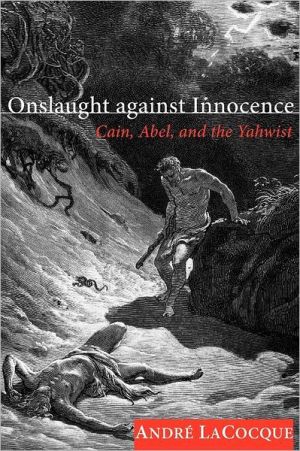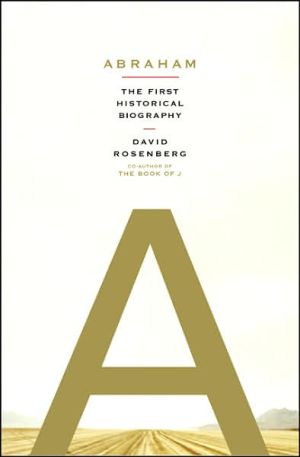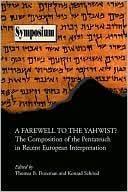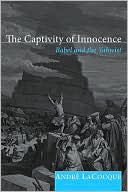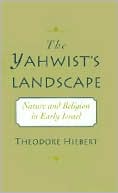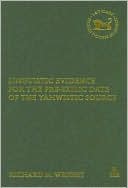Hidden Book in the Bible
Renowned biblical sleuth and scholar Richard Elliot Friedman reveals the first work of prose literature in the world-a 3000-year-old epic hidden within the books of the Hebrew Bible. Written by a single, masterful author but obscured by ancient editors and lost for millennia, this brilliant epic of love, deception, war, and redemption is a compelling account of humankind's complex relationship with God. Friedman boldly restores this prose masterpiece-the very heart of the Bible-to the...
Search in google:
Renowned biblical sleuth and scholar Richard Elliot Friedman reveals the first work of prose literature in the world-a 3000-year-old epic hidden within the books of the Hebrew Bible. Written by a single, masterful author but obscured by ancient editors and lost for millennia, this brilliant epic of love, deception, war, and redemption is a compelling account of humankind's complex relationship with God. Friedman boldly restores this prose masterpiece-the very heart of the Bible-to the extraordinary form in which it was originally written. Robert Alter . . .[T]he compelling appeal of the book is the thesis, not the translation. . . .a challenging, exhilarating theory that will force biblical scholars to rethink some basic assumptions, but he has not made a conclusive case. . . .[He] has put forth a bold thesis that should give everyone pause. —The New York Times Book Review
Chapter One\ \ \ EVERY NEW TRANSLATION OF THE BIBLE BRINGS ITS OWN SET OF PURPOSES IN ADDITION TO THE TRANSLATORS' PARTICULAR SKILLS AND FEELINGS FOR THE TEXTS. Some seek the most literal possible rendering of the text. Some seek to produce the most felicitous possible reading in English. Some seek to reproduce the feeling of the Hebrew: to capture its puns, afliteration, and rhythms. Most translators seek some combination of these things, and they differ in the particular extent to which they favor one purpose or another. My purpose in this translation is somewhat different from these. Since I am presenting a particular work for the first time, it is especially important that I convey the text of the original as carefully as possible. So, for example, when a wording is unclear in the original in a few cases, I do not try to clear it up in the translation. I use a translation that retains the unclarity of the Hebrew. This may be annoying or frustrating to readers. But that is the point: it is annoying and frustrating as one reads it in the original. My task is to translate the Bible, not to make a better Bible. I have to accept the fact that I am the translator, not the author. This does not mean that I have given up on producing a felicitous English. It means that, if the reader finds this work to be a "good read," as I hope you will, it is primarily because of the qualities of the original, and not because of my own refashioning of its language. And when you find an occasional awkwardness, I hope that you will find it worthwhile to join the biblical scholars in encountering the difficulties of the Bible's text rather than having the scholar try to solve itfor you or hide it from you. In the end, I hope that you will agree that, even in translation, the power and beauty and sensitivity of this work shine through.\ My expectation is that most of my colleagues in the field will want to note the verses as listed on p. 12 and read the text in the Hebrew. This translation is primarily for persons who are not sufficiently advanced in Hebrew to read the text in the original. Therefore, this is not an annotated critical edition of the text. Because I want readers to be able to feel the continuity of this work, I did not want readers' attention to be interrupted by footnotes. Someday an annotated version should be done, with full text-cnitical. apparatus, but the purpose of this first translation of the work is to provide an opportunity to read the work from beginning to end without interruption. I have provided Textual Notes on some specific points, on PP. 305-324. 1 have translated the Masoretic Text (MT) generally, with only a few changes based on Greek or Qumran (Dead Sea Scroll) versions, none of which is crucial to the points that I am emphasizing elsewhere in the book. (Citations of chapter and verse refer to the Masoretic Text. In some English translations there are occasionally differences of a verse or two, or even several verses, in their numbering. For example, Gen 32:4-13 in the Hebrew text is Gen 32:3-12 in many translations. Readers whose practice is to look up cited passages when reading books about the Bible, or who want to compare the translation here with other translations, are hereby advised to take this into account.)\ Following are some notes on a few basic points of this translation:\ 1. The original uses very simple language: "big," "very much," "heavy," "bad." When translators turn it into more sophisticated language and enrich the vocabulary by using multiple English translations for the same Hebrew word (for example, "big," "great," "mighty," etc., for gadol), they make it sound better in English but mask the simplicity and consistency of the original. I am especially moved to keep the multiple translations of single Hebrew words to a minimum, precisely to let readers become aware of this quality of the language and of this author's way of making so much out of a relatively small bank of vocabulary. This should also help readers to get a feeling for the consistency of language through this work.\ So, as a major example, the Hebrew word ra' has a tremendous range: from "bad" to "harm" to "terrible" to "evil" to "wretchedness." But I translate it in almost every occurrence as "bad," even though this will seem like an insufficiently strong word in several places, in order to convey the important point that this work's story begins with the eating from the tree of knowledge of good and bad, and that this introduction of human knowledge of bad begins a chain of actions that will inform the story until its end.\ Similarly, I translate Hebrew har consistently as "mountain," though it can refer to a large mountain or a small hill.\ This goes for the Hebrew conjunction as well, which begins almost every verse. It usually means "and," but it has a wider range of meanings as well, so translators make it "but," "since ... .. while," and more. I leave it as "and" in English except in cases in which the text absolutely forces us to take it differently. Further, some recent translators simply leave it out altogether; so, unlike the KJV, Psv, and JPS, each sentence in these translations does not begin with the word "and." On this point, too, I prefer to retain the feel of the original. I retain the word "and" where it occurs in the Hebrew.\ 2. Many translators eliminate old English terms--the "whither's" and "thither's" and "whence's" and "thence's" and "hence's" and "thee's" and "thy's" and "thou's"--to produce a contemporary translation; yet they stiff retain some old terms that do not have ready counterparts in contemporary English, such as "lest" and "in the midst."\ The Hidden Book in the Bible. Copyright © by Richard E. Friedman. Reprinted by permission of HarperCollins Publishers, Inc. All rights reserved. Available now wherever books are sold.
\ Robert Alter. . .[T]he compelling appeal of the book is the thesis, not the translation. . . .a challenging, exhilarating theory that will force biblical scholars to rethink some basic assumptions, but he has not made a conclusive case. . . .[He] has put forth a bold thesis that should give everyone pause. —The New York Times Book Review\ \ \ \ \ Robert Alter. . .[T]he compelling appeal of the book is the thesis, not the translation. . . .a challenging, exhilarating theory that will force biblical scholars to rethink some basic assumptions, but he has not made a conclusive case. . . .[He] has put forth a bold thesis that should give everyone pause. -- The New York Times Book Review\ \ \ Gary A. AndersonUnlike most introductions to the problem of the Bible's sources, Friedman's makes the work of several generations of biblical scholars come alive on the page...Any layperson can read this book and appreciate the revolution that modern biblical scholarship spawned...Friedman has accounted for the fact that the Bible is more than the sum of its parts and that its canonical whole is worthy of admiration. Friedman is no theologian but he is wise enough to sense the important issues. \ — First Things\ \
